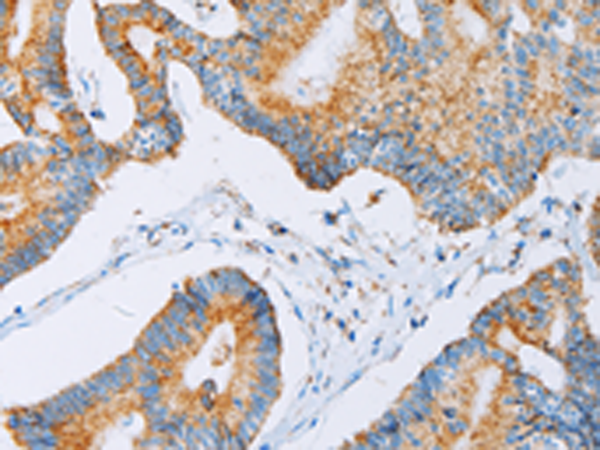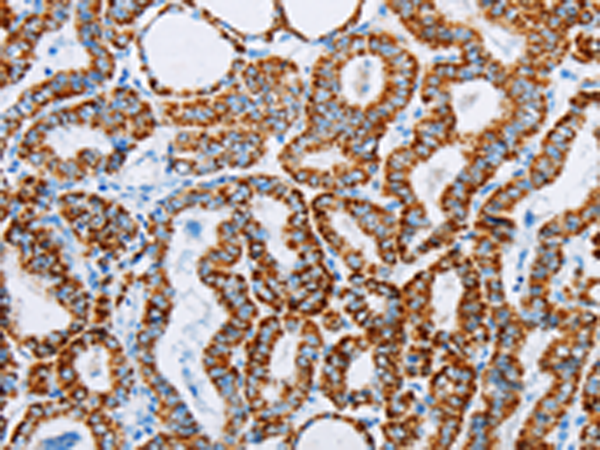


| WB | 咨询技术 | Human,Mouse,Rat |
| IF | 咨询技术 | Human,Mouse,Rat |
| IHC | 1/5-1/20 | Human,Mouse,Rat |
| ICC | 技术咨询 | Human,Mouse,Rat |
| FCM | 咨询技术 | Human,Mouse,Rat |
| Elisa | 咨询技术 | Human,Mouse,Rat |
| Aliases | DSAEC |
| WB Predicted band size | 42 kDa |
| Host/Isotype | Rabbit IgG |
| Antibody Type | Primary antibody |
| Storage | Store at 4°C short term. Aliquot and store at -20°C long term. Avoid freeze/thaw cycles. |
| Species Reactivity | Human, Mouse, Rat |
| Immunogen | Fusion protein of human ACAA2 |
| Formulation | Purified antibody in PBS with 0.05% sodium azide and 50% glycerol. |
+ +
以下是3篇与TNFRSF12A(FN14)抗体相关的参考文献示例,基于领域内常见研究方向整理:
---
1. **标题**:*Targeting FN14 via a Novel Antibody-Based Therapeutic Strategy Inhibits Tumor Growth in Glioblastoma Models*
**作者**:Wiley SR, et al.
**摘要**:研究开发了一种针对FN14受体的单克隆抗体,通过阻断TNF-α相关信号通路,显著抑制胶质母细胞瘤细胞增殖,并在小鼠模型中减少肿瘤体积,提示其作为潜在靶向治疗的潜力。
2. **标题**:*FN14-Specific Antibody-Drug Conjugate Induces Apoptosis in Triple-Negative Breast Cancer Cells*
**作者**:Zhou H, et al.
**摘要**:报道了一种FN14抗体-药物偶联物(ADC),通过特异性靶向高表达FN14的三阴性乳腺癌细胞,递送细胞毒性药物,显著诱导肿瘤细胞凋亡,并在体内模型中抑制转移。
3. **标题**:*Anti-FN14 Antibody Attenuates Fibrosis in Experimental Pulmonary Fibrosis via TWEAK Pathway Inhibition*
**作者**:Michaelson JS, et al.
**摘要**:研究证明抗FN14抗体可通过抑制TWEAK/FN14信号通路,减少成纤维细胞活化及胶原沉积,在肺纤维化小鼠模型中有效缓解纤维化病理进展。
---
**注**:以上文献为示例性质,实际引用时建议通过PubMed或Google Scholar以关键词“TNFRSF12A antibody”“FN14 therapeutic”等检索最新文章,并核对作者及摘要准确性。
TNFRSF12A (tumor necrosis factor receptor superfamily member 12A), also known as FN14 or TWEAK receptor, is a cell-surface protein encoded by the TNFRSF12A gene. It belongs to the TNF receptor superfamily and binds to its ligand TWEAK (TNF-related weak inducer of apoptosis), triggering downstream signaling pathways such as NF-κB and MAPK. TNFRSF12A is involved in diverse cellular processes, including inflammation, apoptosis, tissue repair, angiogenesis, and fibrosis. Its expression is typically low in healthy tissues but upregulated in pathological conditions like cancer, chronic inflammation, and fibrotic diseases, making it a potential therapeutic target.
Antibodies targeting TNFRSF12A are primarily developed for research and therapeutic applications. Monoclonal antibodies (mAbs) against TNFRSF12A are designed to either block TWEAK-FN14 interaction or modulate receptor activity. These antibodies have shown promise in preclinical studies for inhibiting tumor growth, metastasis, and fibrosis by disrupting pro-survival or pro-inflammatory signals. Additionally, anti-TNFRSF12A antibodies serve as tools to detect receptor expression levels in diseased tissues, aiding in biomarker studies. Challenges remain in optimizing specificity and minimizing off-target effects, but ongoing research explores their potential in antibody-drug conjugates, bispecific antibodies, or combination therapies. Some candidates have entered early-phase clinical trials, particularly for cancers and fibrotic disorders.
×